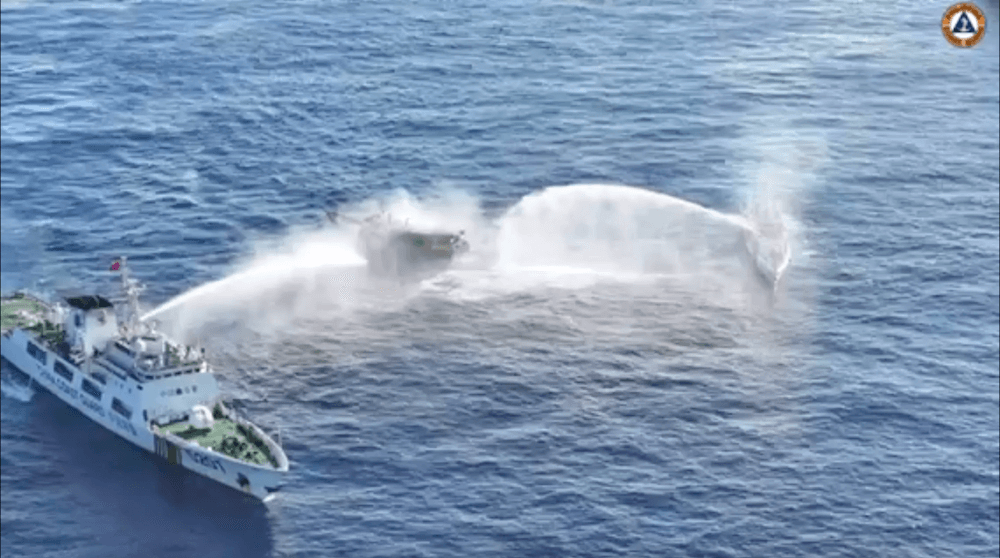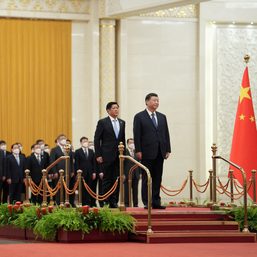SUMMARY
This is AI generated summarization, which may have errors. For context, always refer to the full article.

MELBOURNE, Australia – The United States on Wednesday, March 6 (late Tuesday, March 5 in Washington DC), affirmed that attacks on the Philippine Coast Guard (PCG) are covered by the decades-old Mutual Defense Treaty that binds Washington and Manila.
“The United States stands with our ally the Philippines following the People’s Republic of China’s (PRC) provocative actions against lawful Philippine maritime operations in the South China Sea on March 5,” US State Department Spokesperson Matthew Miller said in a statement.
“The United States reaffirms that Article IV of the 1951 US-Philippines Mutual Defense Treaty extends to armed attacks on Philippine armed forces, public vessels, or aircraft – including those of its Coast Guard – anywhere in the South China Sea,” he added.
Miller was reacting to China’s actions against a Philippine rotation and resupply mission to the BRP Sierra Madre Ayungin Shoal in the West Philippine Sea on March 5. The Sierra Madre, an old World War II ship that was intentionally run aground on the shoal in 1999, serves as a military detachment.
Monthly missions to the BRP Sierra Madre are almost always fraught with and full of danger but the March 5 incident would be among the most dangerous in recent history. The China Coast Guard (CCG) collided with two Philippine ships – the PCG’s BRP Sindangan and the Navy-contracted Unaizah May 4.
Two CCG ships also used their water cannons simultaneously against the Unaizah May 4, shattering its wind shield and causing minor injuries on four Navy personnel.
“We condemn the PRC’s repeated obstruction of Philippine vessels’ exercise of high seas freedom of navigation and its disruption of supply lines to this longstanding outpost,” said Miller.
China claims almost all of the South China Sea, despite a 2016 arbitral award that declared Beijing’s stand as invalid. Ayungin Shoal, well within the Philippines’ 200-nautical mile exclusive economic zone (EEZ), is Chinese territory, in the eyes of Beijing.
“The PRC’s actions again show disregard for the safety and livelihoods of Filipinos and international law,” said Miller.
The US and the Philippines are long-time treaty-allies. The Mutual Defense Treaty, signed in 1951, is a promise by both countries to come to each other’s defense in the event of an attack. It is one of three agreements that govern Philippines-US defense relations.
“The United States calls upon the PRC to abide by the ruling and desist from its dangerous and destabilizing conduct,” said the State Department spokesperson.
Asked in a press conference for specifics on what actions would trigger the MDT, Miller said: “I’m not going to speculate or get out ahead of any discussions with – in this regard.” But the State Department spokesperson confirmed they were “in discussions with the Philippines about this matter.”
President Ferdinand Marcos Jr., who is in Melbourne for the Association of Southeast Asian Nations (ASEAN)-Australia Special Summit, has yet to make a comment on the latest act of Chinese harassment in the West Philippine Sea.
While in Melbourne, Marcos reiterated an earlier assertion: that regional security should be understood not just through the lens US and Chinese rivalry, but through the interests and aspirations of states involved.
“We, in the Indo-Pacific, must ensure that great powers do not treat the world as an arena for their competition. The pursuit of the great powers’ respective strategic goals must never come at the expense of the interests of smaller states, nor of regional and international peace,” said Marcos in a speech before the Lowy Institute days before the March 5 incident in the West Philippine Sea.
The West Philippine Sea has been a flashpoint for tensions in the region, as Chinese ships turn more aggressive in either asserting their regular presence in the area or driving away Filipinos.
The Philippines, through the Department of Foreign Affairs, demanded “Chinese vessels leave the vicinity of Ayungin Shoal immediately.” – Rappler.com
Add a comment
How does this make you feel?


















![[Just Saying] SONA 2024: Some disturbing points](https://www.rappler.com/tachyon/2024/07/TL-marcos-sona-points-july-23-2024.jpg?resize=257%2C257&crop=335px%2C0px%2C720px%2C720px)

There are no comments yet. Add your comment to start the conversation.